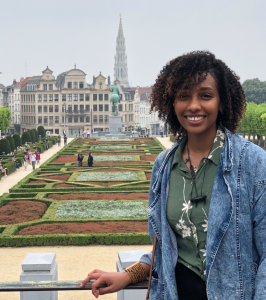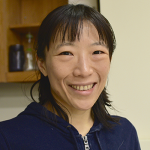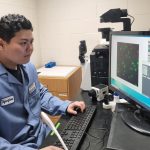Summer in Belgium

Last summer, Rayyan Gorashi ’19 had a bucket list-worthy few months. The chemical and biomolecular engineering major hiked the French Alps and dusted off her high school French in Paris. She cheered on the Belgium national team in the FIFA World Cup with fans in Leuven’s packed Oude Markt (old market). And she expanded her world view by thinking very, very small.
Gorashi was one of five Whiting School undergraduates selected for Johns Hopkins’ Institute for NanoBioTechnology’s International Research Experience for Students program in Leuven, Belgium. Funded by the National Science Foundation, the students spent 10 weeks as research interns at Interuniversity MicroElectronics Centre (imec).
 As part of imec’s Cell and Tissue Technology group, Gorashi focused on a protocol for a heart-on-a-chip device—a big idea in health care that will be realized by the smallest of nanoelectronics. “The microfluidic plate contains 16 independent wells that are just a fraction of a millimeter wide and tall,” she explains of the chip’s tiny independent wells, which allow for simultaneous tests for cardiotoxicity of pharmaceutical drugs.
As part of imec’s Cell and Tissue Technology group, Gorashi focused on a protocol for a heart-on-a-chip device—a big idea in health care that will be realized by the smallest of nanoelectronics. “The microfluidic plate contains 16 independent wells that are just a fraction of a millimeter wide and tall,” she explains of the chip’s tiny independent wells, which allow for simultaneous tests for cardiotoxicity of pharmaceutical drugs.
Peter Searson, the Joseph R. and Lynn C. Reynolds Professor of Materials Science and Engineering and INBT co-founder, established the imec-INBT internship program in 2009. His goal: to give engineering students research experience and help them learn what it means to be part of a global team working on STEM challenges.
Gorashi was happy to step outside of her comfort zone and extend the research skills she learned in the lab of INBT Director Sharon Gerecht, the Kent Gordon Croft Investment Management Faculty Scholar. “[imec] has made me more adaptable to different lab environments and definitely opened doors,” says Gorashi, who is president of the Hopkins Organization for Multicultural Engineers and Scientists, the Johns Hopkins University’s National Society of Black Engineers chapter.
“Being in the Flemish part of Belgium definitely pushed me a bit too,” she says of Leuven’s Dutch language dialect. She loved exploring the city and Europe, rekindling her love of French, and discovering a new passion: Dutch pancakes.
But the most important bucket list checkoff just might have been problem-solving unanticipated setbacks in her research, including dealing with clogs and leaks in the device’s valve system. “Overcoming these obstacles is what makes research research,” Gorashi noted. “It’s the very essence of the creativity that’s necessary for devising solutions.”
This story originally appeared in the JHU Engineering magazine Winter 2019 issue.
Top photo copyright imec.
Want to learn more?
Read our student blogs from current and past IRES interns about their experiences.
A Summer of Science Abroad features the people that have made this mutually beneficial program a success.
We are recruiting students for the summer 2019 IRES program. Interested students should see the program information and how to apply on our IRES program webpage.





